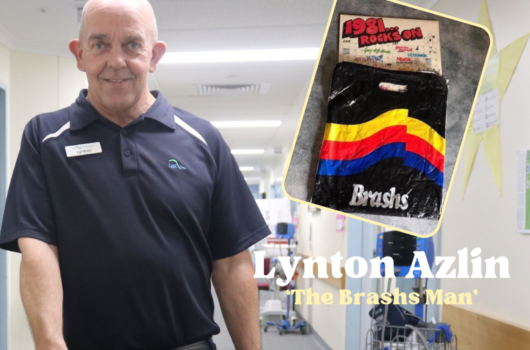Meet our staff: Midwife Medina is taking on infant mortality in South Sudan

A Latrobe Regional Health midwife and nurse who spent 12 years in a refugee camp in Uganda after
fleeing civil war in South Sudan, is using her skills to help tackle high maternal and infant mortality rates in her home country.
Medina Lamunu arrived in Australia in 2006 and joined the Thomson Women’s and Children’s Unit in September after gaining her nursing degree in 2017 and studying midwifery in 2018 at Federation University in Churchill.
She learned English in the refugee camp, where her mum remains after 30 years, unable to come to Australia.
“When I was a child in a war zone in Sudan, my dream was to stay alive and have something to eat,” Medina said.
“My mother used to say when gunshots could be heard from afar at dinner ‘make sure you eat so that if you get hurt from the gunshot, it will not hurt a lot and if you die, you will not die hungry.’
“In the refugee camp, we relied on the United Nations to bring food, but sometimes they missed us, so we had to sell firewood, or make and sell alcohol to local villagers to buy food.”
Medina decided to become a midwife when she learned that a friend in South Sudan died in childbirth due to a postpartum haemorrhage, leaving behind five kids, including the newborn.
The mum-of-six gave birth to her own babies in Casey, Wonthaggi and Warragul hospitals which gave her a first-hand experience into the high standards of care for new mums in Australia.
“In South Sudan there is a lack of trained midwives and most women tell of their horror when they go to a hospital as the care is not good, or they are helped by older women in the village,” she said.
“Some women get slapped to keep quiet if they make a lot of noise in labour, or yelled at for not understanding or for getting anxious during intrapartum. This would never happen in Australia.”
Medina is now undertaking a mammoth project to coordinate building a new maternity clinic and school to help mums and kids access health care and education in South Sudan.
According to UNICEF, neonatal conditions are the leading cause of death for people in South Sudan, with almost 99 deaths per 1000 live births.
Medina and her husband George formed not-for-profit group African Action South Sudan and raised more than $200,000 to build the school.
They are planning to build the Orison Medical Centre, a maternal and child health project in Obbo South Sudan. Orison meaning ‘prayer’.
The adjoining school is now accommodating 300 children staffed by trained teachers who are properly paid. The maternity unit stocked with equipment from Australia, will open at the end of next year.
Medina said staffing was a challenge but many medicos are ex-Ugandan refugees who trained overseas and will be working at the Orison centre under good conditions.
“The local government inadequately funds schools and hospitals, but funds the army mostly. Healthcare workers don’t get paid adequately, so some sell drugs from the care centres, reported by local community,” she said.
Meanwhile, back at LRH, Medina is making sure new mums have a smooth experience, and she enjoys working with the diverse community in the Latrobe Valley.
“Working at LRH is different and interesting considering the catchment areas where some women come from to have their baby, especially for complicated care,” Medina said.
“I feel like I have come home. I am grateful to be alive after being surrounded by war.”






